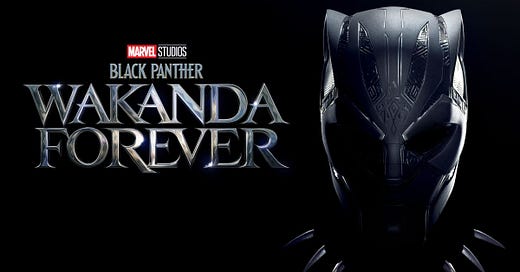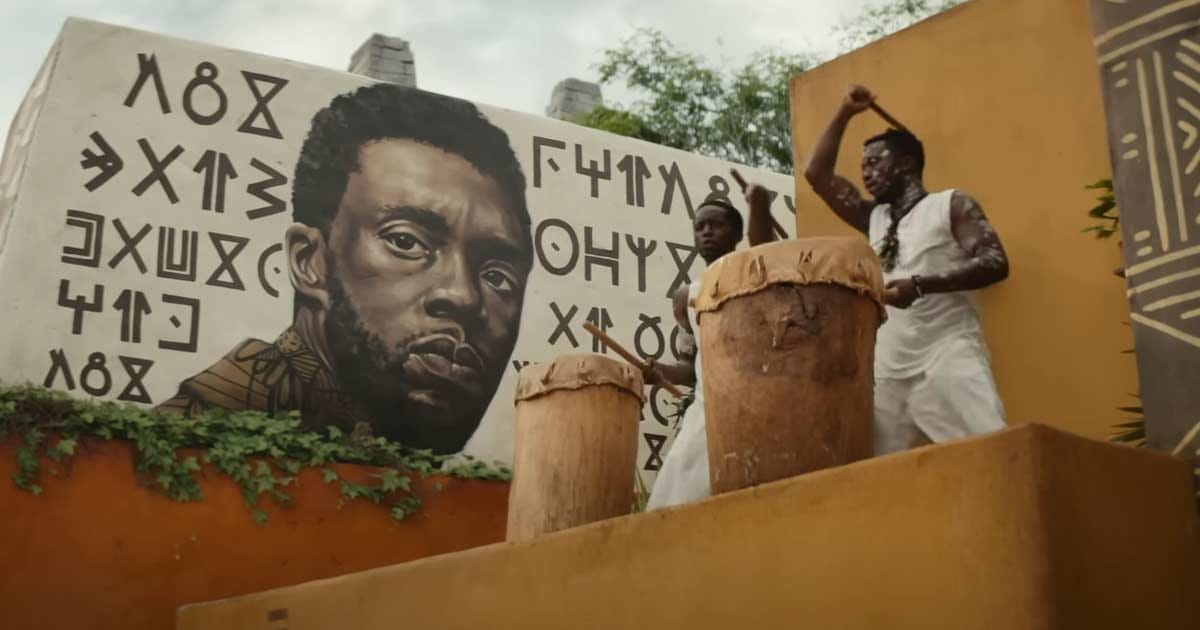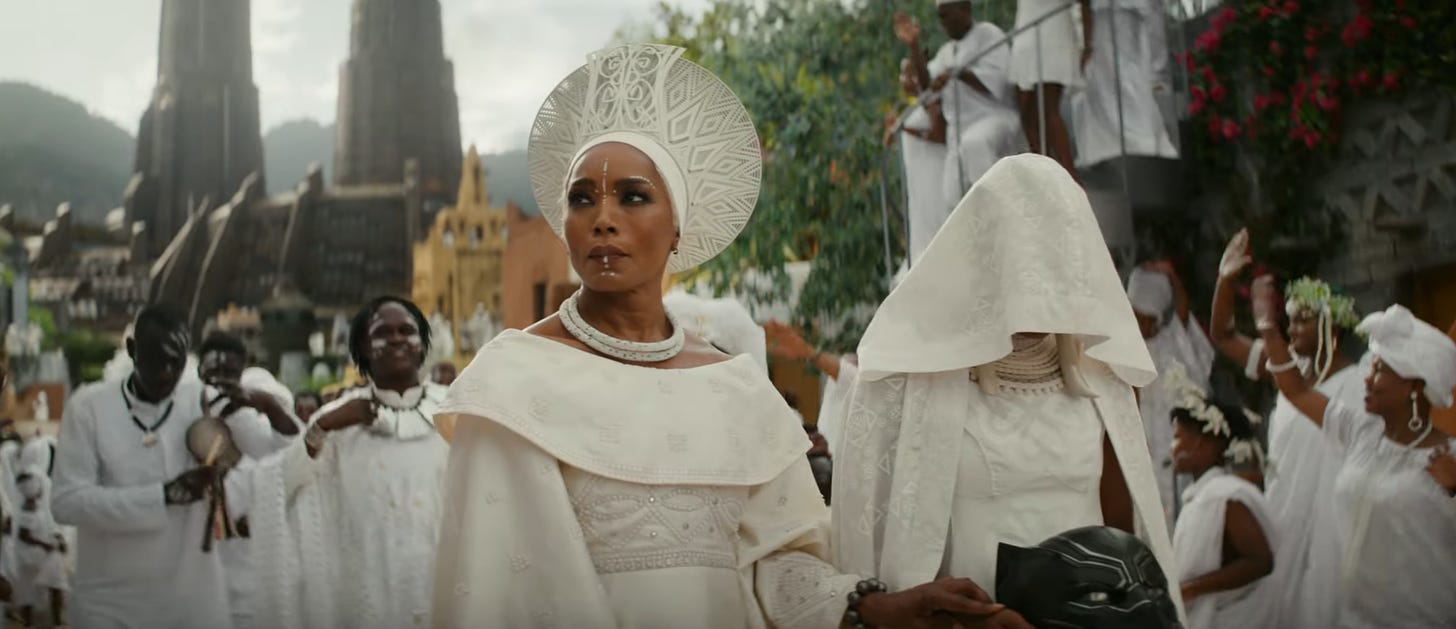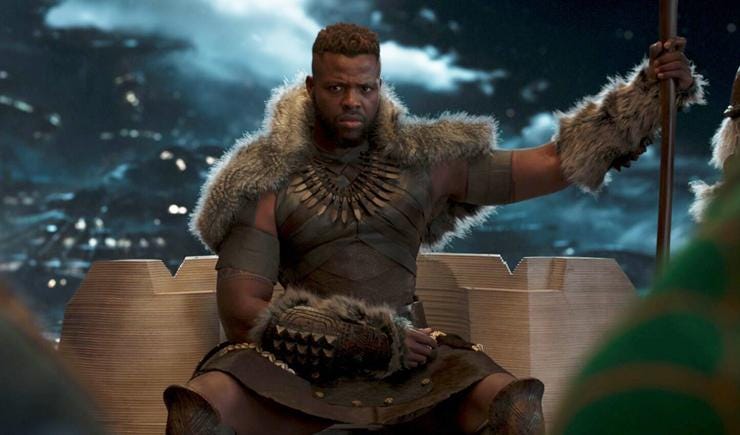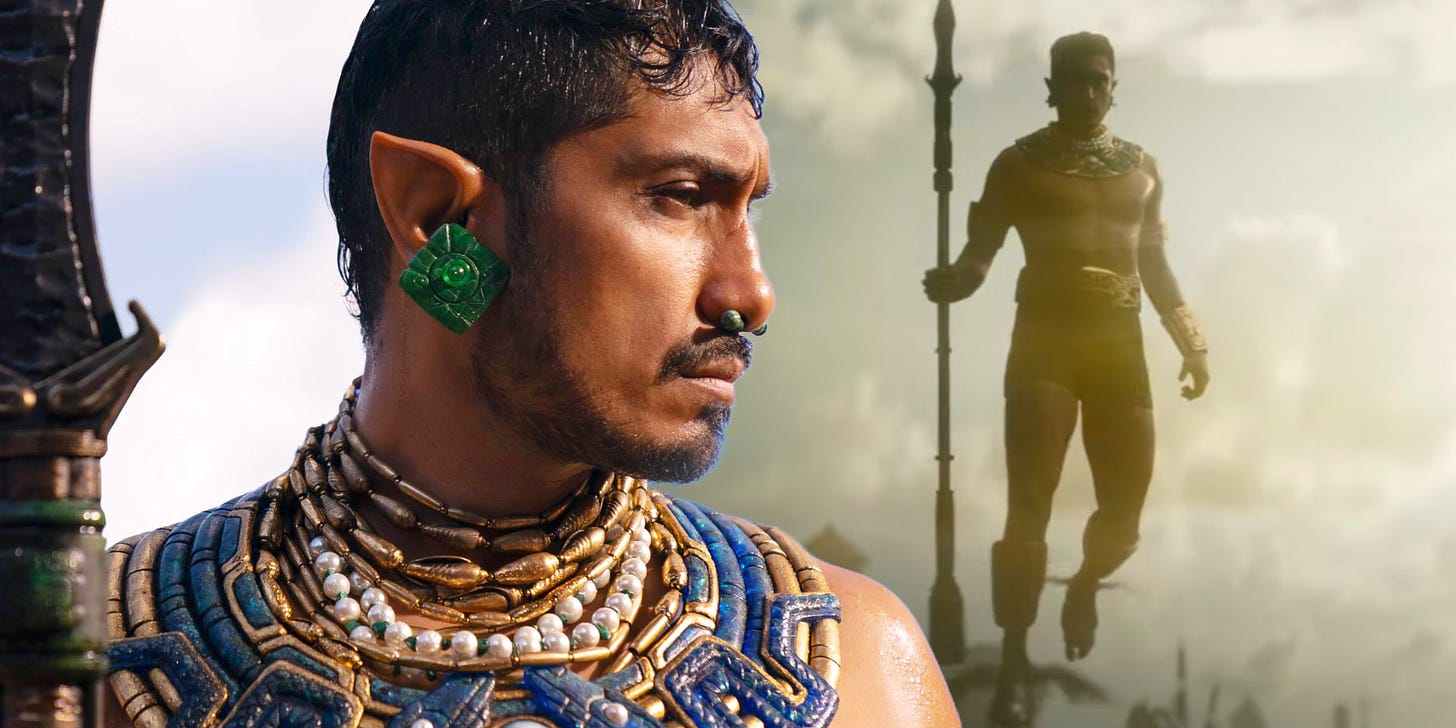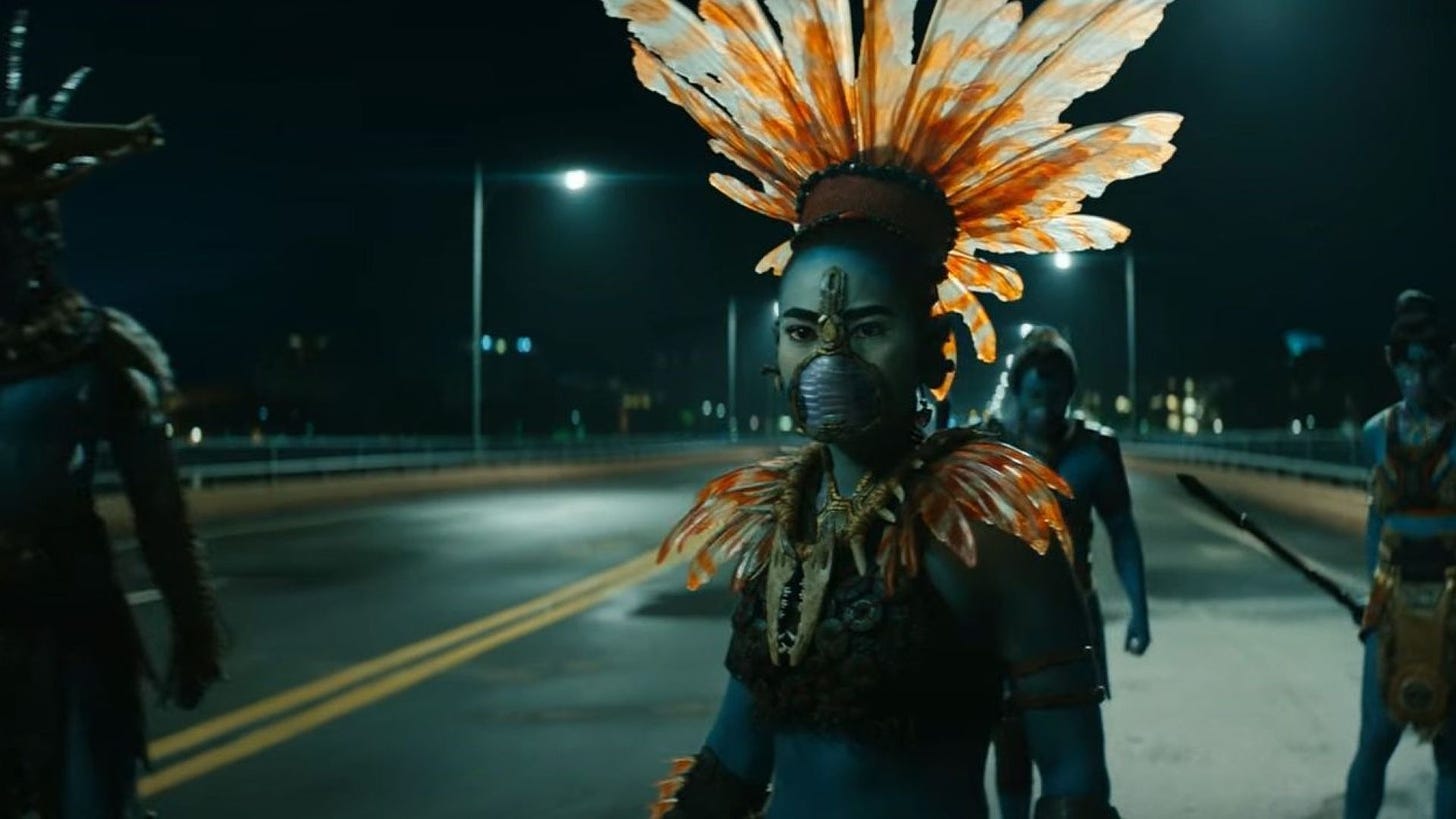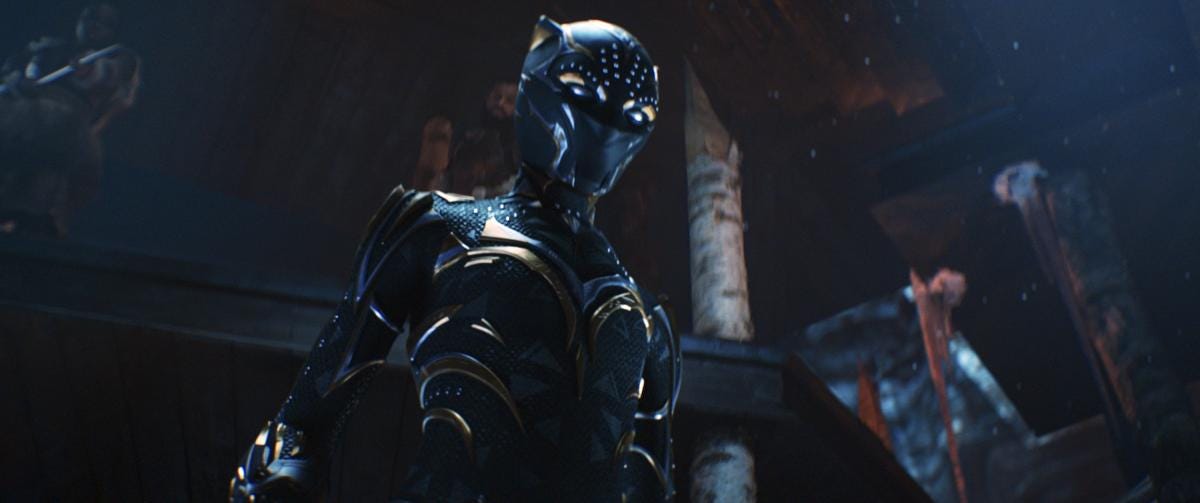Wakanda Forever: Movie Review (Spoiler)
Black Panther as a comic and franchise has been a polarizing story, one that mirrors fragments of African culture through a fictionalized Afrofuturistic lens. This fictitious reality is Wakanda, a country devoid of European colonization in Africa and pervasive with wealth in the form of Vibranium. This context shall inform my compliments as well as my critiques related to this film. I examine Black cinema and characters through the lenses of intent, impact, influence, and implications related to racial socio-political autonomy.
On the heels of Chadwick Boseman's untimely transition, both Ryan Coogler and the cast had the imposition of creating a film without its star and a dear friend. The responsibility of creation amid agony bears an indescribable toll, and this cast masterfully navigated the terrain of grief whilst honoring Chadwick Boseman as T'challa. At the inception of the film, Coogler elegantly directed a poignant African-centered ceremony that venerated T'challa in a vibrant celebration. The sequences of people dancing, wearing white African garb, drumming, and invoking African spiritual rituals was beautiful and captured a real element of culture on the continent. Chadwick was beautifully memorialized. The weight of grief was palpable in this ceremony and was tangible in how it impacted Shuri, Queen Ramonda, Okoye, etc. The real-life parallel of this scene to reality is unimaginable, and its emotional effect on the actors I'm sure was insufferable. The impact of the scene normalized the African tradition of ancestor veneration and spirituality, seeing death as a transition, not a conclusion.
This film dealt with the complexities of grief in such a way that demonstrated its psycho-emotional effects and its various stages. From Queen Ramonda dealing with acceptance to Shuri contending with Denial/Anger, it showed the nuance of grief. In various ways the depictions of grief normalized the psychological turbulence that comes from loss, this was a powerfully influential element. The poetically ironic presence of void was felt in the wake of T'challa's transition, seeing Okoye and others crippled by uncertainty in leadership and the Black Panther mantle. This was impactful as it showed the significance of Black male leadership. This is underscored when M'baku is called upon by Queen Ramonda for political counsel for direction regarding affairs of Wakanda, the implications are evident, masculine Black male guidance is needed and valued in the absence of T’challa. An aspect that dispels any illusion of Black men being obsolete in the face of T'challa not being hastily re-casted. M'baku played a vital role in defending Wakanda while honoring the Black women in positions to make decisions. Black women were beautifully nuanced and layered in this film, shown in a light that highlights their tenderness and resilience.
M'baku often plays a subtle and yet impactful surrogate brother to Shuri, by advising her decisions and urging tradition. In a film devoid of the likes of W'kabi(Daniel Kaluuya/filming conflicts), Winston Duke did an excellent job fulfilling that male leadership. This film immersed you in the world of Wakanda in a more expansive and emotionally satisfying way, showing you the soul of its nation. I love how we saw Queen Ramonda's incessant nurturing of Shuri, as we saw the plight of Shuri's coping with grief in the form of manic obsession with technology as a defense mechanism. We see Shuri seeking peace, balance, and resolution from her grief while simultaneously looking to fill the shoes T’challa has left behind. I enjoyed the collectivist support shown in this effort from Okoye, The Queen, Nakia, etc. The action scenes were very compelling and thoroughly pleasant, particularly the hand-to-hand combat scenes. Seeing Dora Milaje in action is always satisfying, intense, and empowering such that women are shown as more than damsels in distress but as skilled warriors.
Okoye was shown in a much more vulnerable light that showed the softness of her otherwise tough exterior, seeing her passion for her nation was palpable and her performance was riveting. Seeing her willingness to sacrifice and defend her country with a unmatch witticism was magnetic. Her fight scene against multiple Talokan warriors was astonishing, showing her rebel spirit and skills. Angela Bassett was remarkable and was the film’s anchor as Queen Ramonda, she was bold, beautiful, and brave as the Queen Mother. She was a constant force that demanded the attention of the audience with her piercing wisdom, conviction, and elegance in each scene she was in. Her scene at the UN conference showed her socio-political acuity as it relates to the duplicitous nature of French governmental operations, as we saw her decisive dismantling of the propaganda of American representatives. The back-and-forth engagement of Queen Ramonda and Okoye after Shuri was captured, was a very visceral scene showing range and the contention created by grief. Lupita as Nakia was refreshing to see as she too was excellent, and like the rest of the cast had a unique grief response which looked like “flight”. We saw Nakia cope with T’challas’s death by fleeing from Wakanda and processing his transition while living in Haiti devoid of the responsibilities of Wakanda. Nakia faces internal challenges of feeling unsure of her place in Wakanda while also grieving the love of her life, the tears she shed when speaking of T’challa illuminated a real sentiment that she held for Chadwick.
One particular character who was a constant scene-stealer was Riri Williams played by Dominique Thorne, her comedic relief brought a much-needed lightness to an otherwise melancholy film. Seeing her brilliance on display was amazing, it showed diverse imagery that normalizes the depiction of Black girls in STEM-related fields. Seeing her role in this film was a great build-up for her soon-to-be Disney plus series. Another undeniable element of this film was the infusion of the Indigenous Latino representation in the form of the Talokan underwater kingdom(inspired by central/south American mythology), which was led by Namor played by Tenoch Huerta. I loved the story of the Talokan people, it was compelling and complex in detailing the struggles of overcoming oppression such that Namor executed the liberation of his people against his oppressors.
Namor understood the importance of safeguarding his people “by any means necessary”, a shrewd operator with an acute understanding of European imperialism. I loved his dedication to libration and his character was unyieldingly polarizing throughout the film in the command of Wakanda and the leadership of Talokan. Although propositioned as the film’s “villain”, I feel a more apropos title would be “revolutionary”. Namor was interested in the sole freedom and autonomy of his people in the face of plunder from the U.S. Government. There was a beautiful parallel between Talokan and Wakanda, in that both groups were at the source of great power, collectivist values, and rich culture and were viewed as an imminent threat to American power. Talokan had an ethereal underwater world that rivaled the beauty of Wakanda, a haven Namor sought to protect. I loved seeing the backstory of Namor as a child enacting retribution against slave masters who had captured his people, Namor had an unwavering pulse for sociocultural and political strategy in a way that involved his people’s freedom. I thought Coogler was great at making sure to detail at least a modicum of the true history of European colonization, an effort I’m sure was limited by Disney.
The Talokan was about that smoke, this was evident in their precision in tactical warfare. I loved how they went for blood and were uninterested in "apprehending” insurgents who attempted to pillage them. The action sequences where they killed all the operatives at sea attempting to mine the Vibranium, were cinematically pleasing in a way that felt like restitution. To my chagrin, The Talokan are the cold-blooded operators that I wish the Wakandans were, they are unapologetically about that action and it was beautiful to see. I enjoyed how Namor respected Wakanda as a powerful nation and sought to create an alliance to conspire against the American military threats, he wanted to ensure the posterity of both nations. During the introduction of Talokan, Shuri was constantly faced with the challenge of filling the void of the Black Panther mantle and we saw her finally reproduce the heart-shaped herb.
I enjoyed how the herb acted as a reflective force that revealed you to yourself, in that the ancestral plane caused her to come to grips with her immense animus and indignation. Shuri was confronted by Killmonger the embodiment of the two aforementioned feelings, I loved this shocking exchange that forced Shuri to deal with her authentic self. This was an impactful scene that implied the importance of introspection and emotional processing of one’s authentic self, a very African-centered approach. We saw Shuri still resisting this authentic self until she learned to accept she indeed was angry and wanted revenge for the death of her mother. Shuri finally accepted the mantle of Black Panther, and it was empowering to see that image for little Black girls. We saw the maturation of Shuri as a person and leader, seeking peace in a time of war and grief. I loved the multifaceted tonality of this film which was anchored by cultural nuance, social commentary, and processing of inevitable existential conflicts; Coogler gives you a story with superheroes, not a “superhero story”. There’s a transcendent relatability that goes beyond superficial good vs evil.
Ultimately the entire cast did a sublime job coming together to create a film that is both entertaining and thought-provoking. Comparatively, this film is like a 2015 Golden State Warriors victory without Steph, seeing Klay, Dray, and Andre feels good but you still wanted to see Steph. Steph like Chadwick Boseman was an atmospheric force whose gravitational pull shifted the space and people around him with his presence. This movie (although great) missed the force of his presence, and I felt they often reminded me of that by showing the chaos T’challa’s absence caused. Many feel the Black male lead wasn’t honored, but I believe it was best honored by showing how the wake of his absences created such a void for the characters on screen. The entrance of Prince T’challa will make way for a new T’challa/Black Panther(I hope Damson Idris) in future films without glossing over Boseman’s passing. Also avoiding immediate comparisons by hastily finding a replacement for T’challa with no build-up to endear the new T’challa to the audience.
Critiques:
I believe it’s important in our efforts to entertain ourselves that we are cognizant of the subliminal socio-political messages that are transmitted under the pretext of such a label of “entertainment”. In that vein, it’s imperative to make mention of Wakanda’s ironic passivity as the most powerful technologically advanced nation in the world, this emphasizes that no matter how powerful they are they will ultimately be subverted by white paternalistic control from the likes of Kevin Feige. As Wakanda’s greatest impediment is Marvel’s disinterest in seeing Wakanda exemplified as an unapologetic nation that punishes its enemies as written by Reginald Hudlin in the comics. This was evident when France special forces military group attacked a Wakandan base seeking to plunder Vibranium, and instead of them being killed they were safely apprehended. This passivity displays a distasteful leniency that Americans would never give in return. Wakandans are far too accommodating in their dealings with America, this is the doings of Marvel’s sociopolitical propaganda to normalize forgiveness in the face of white imperialistic threat.
This tone of passivity is seen in their dealings with CIA agent Ross, treating him as an honorary Wakandan informant who can be trusted regardless of his complicit role with the government and Shuri’s unwillingness to join Namor in neutralizing a common enemy in the American government. I’ve yet to see Wakanda shed the blood of the colonial threat that incessantly imposes on their resources, and Marvel has made sure to derail this empowering imagery of an African nation killing white terrorists with impunity. Another deplorable element of this film is the perpetual emphasis on intragroup/intergroup warring that often displaces the emphasis on the preeminent threat of white imperialism. In the first film, we saw a divided Wakanda fight against itself rather than the American threat, and in this film, we see intergroup fighting with the Talokan due to Shuri’s refusal to go to war with a country that already initiated an attack at the beginning of the film.
We saw a war between two of the most powerful nations with more in common than dissimilar unnecessarily warring, because of the tolerant attitude of Wakanda toward its enemy. Making Namor a revolutionary vilified, much like Killmonger in the first film Marvel made sure to make him so corrupt that his leadership was inadvisable. Marvel successfully baits and switch the focus from white imperialism to revolutionaries whose visions are sullied by writing that castigates their character and thusly takes white imperialism off the hook. It’s an insidious trope that denotes the sociopolitical economic influence and intent of those who sanction the film’s direction at Marvel. One of the other major aspects of the film I found unnecessary is the death of Queen Ramonda, in a film already inundated with the grief of T’challa her death felt like adding insult to injury with no benefit in the script’s climax or character motive for Shuri.
The passivity regarding Shuri’s forgiveness of Namor after he killed the Queen, again shows the meek response of a powerful nation to be readily docile in the face of threat. Namor is too compelling of a character to kill off in the same film that introduces him, which makes Queen Ramonda's death unnecessary particularly if Shuri isn’t going to avenge her death with bloodshed. These are some of my main critiques that facilitate my political discontent and overall dissatisfaction with Wakanda as the most technologically advanced nation.

